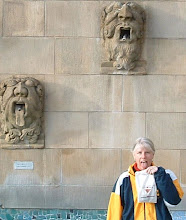As a Digital Literacy SL encompasses just about every aspect of what digital literacies represents. Creating an avatar and identity is just the first part of how this is a complex digital literacy. Being able to negotiate through the creative process, learning how to use the multimodalities that are automatically installed on the screen as tools to use to navigate in SL, and eventually being able to find where you want your avatar to be involved socially, professionally, as a student; the choices are seemingly endless because if you don't find what you want, SL encourages you to create it for your use or to sell to others. (Yes, there are people making money in SL to support themselves in FL, both as normal entrepreneurs and even as celebrities).
As Colin Lankshear and Michele Knoble note in chapter one of their book A New Literacies Sampler titled "Sampling "the New" in New Literacies", Peter Lang Publishing: New York 2007:
"Understanding literacies from a sociocultural perspective means that reading and writing can only be understood in the contexts of social, cultural, political, economic, historical practices to which they are integral, of which they are a part. This view lies at the heart of what Gee (1996) calls the "new" literacy studies, or socioliteracy studies (see also Hull and Schultz 2001, Knobel 1999, Lankshear 1997, Street 1984, 1995). The relationship between human practice and the production, distribution, exchange, refinement, negotiation and contestation of meanings is a key idea here. Human practices are meaningful ways of doing things or getting things done (Scribner and Cole 1981; also Franklin 1990, Hull and Schultz 2001). There is no practice without meaning, just as there is no meaning outside of practice. Within contexts of human practice, language (words, literacy, texts) gives meaning to contexts and, dialectically, contexts give meaning to language." (1-2)
What a mouthful to state that Second Life is constructed to represent what the owners and players consider to be the best of what is offered in a context that is intertextually playful but, because of the community standards, is a serious social construct.
"To play a role, be a particular identity, etc., is a matter of both "getting coordinated" as an element in a Discourse, and of coordinating other elements. Lanugage/literacy is a crucial element of discursive "coordinating," but it is only one aspect, and the other elements need to be "in sync" for fluent performance - literally - to be realised." (3-4)
If having to learn how to manipulate your avatar in SL doesn't help you learn more about both the discourse you are portraying and how to read and understand the multimodalities of how to navigate in SL, then you are not paying attention. SL is the perfect tool to showcase and examine these literacies as they reflect FL and the player.

No comments:
Post a Comment